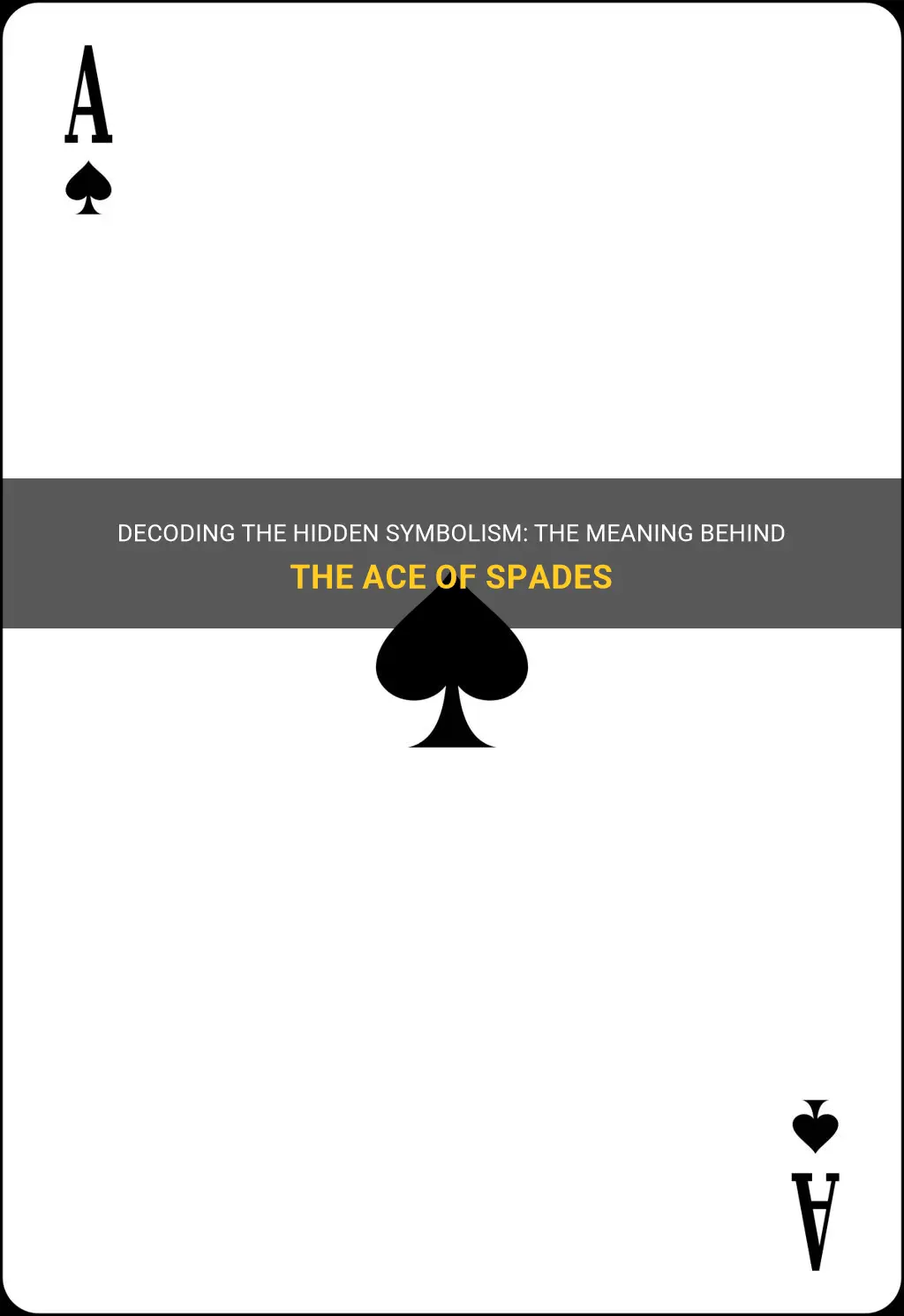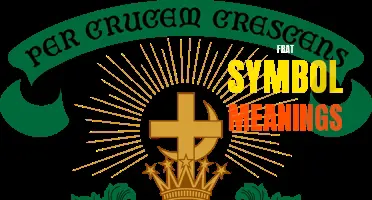
The Ace of Spades has long been regarded as a powerful symbol, carrying deep and mysterious meanings. From its origins in playing card decks to its association with luck and war, the ace of spades has captured the imagination and curiosity of many. This iconic symbol has been depicted in various forms of art, tattoo designs, and even on military equipment. Join me as we explore the fascinating and enigmatic world of the ace of spades symbol and unravel its captivating meanings.
What You'll Learn
- What is the origin and historical significance of the ace of spades symbol?
- What are some common interpretations or meanings associated with the ace of spades symbol?
- How has the ace of spades symbol been used in popular culture, such as in music or art?
- Are there any cultural or regional variations in the meaning or symbolism of the ace of spades symbol?
- Can the ace of spades symbol have different meanings in specific contexts, such as tarot readings or gaming?

What is the origin and historical significance of the ace of spades symbol?
The ace of spades is a playing card that holds special significance in many cultures and has a rich history dating back centuries. It is often considered the most prestigious card in the deck and holds a variety of meanings and associations.
The origin of the ace of spades symbol can be traced back to France during the 17th century. French playing card manufacturers began to include decorative designs on the ace of spades, setting it apart from the other aces in the deck. These designs often depicted intricate patterns, mythical creatures, or the manufacturer's logo.
Over time, the ace of spades became associated with various symbolic meanings. In French culture, it was believed to bring good luck and fortune. It was also seen as a symbol of death and rebirth in certain contexts, likely due to its prominent position as the highest-ranking card in the deck.
During the 18th and 19th centuries, the ace of spades gained further significance, particularly in the context of warfare. In many European countries, it became customary for manufacturers to mark their playing cards with the insignia of the ruling monarch. The ace of spades was often adorned with the royal coat of arms, making it a symbol of power and authority.
In military contexts, the ace of spades took on an even more profound meaning. It became associated with death, as soldiers often used playing cards to identify fallen comrades. The ace of spades would be placed on the bodies of fallen soldiers, serving as a silent tribute to their sacrifice. It also became a symbol of luck and protection, with soldiers carrying the card as a talisman to ward off harm.
During wartime, the ace of spades was further popularized by various military units. For example, during World War II, the United States Army's 506th Parachute Infantry Regiment, also known as the "Band of Brothers," adopted the ace of spades as their official insignia. This emblem represented their bravery and willingness to take risks.
In addition to its military associations, the ace of spades has also found its way into popular culture. It has been featured in numerous films, books, and songs, often used to evoke a sense of danger, mystery, or excitement.
In recent years, the ace of spades has also become associated with the luxury industry. Some high-end companies, such as luxury car manufacturer Rolls-Royce, have incorporated the symbol into their branding, further emphasizing its prestige and exclusivity.
Overall, the ace of spades is a symbol that holds deep historical and cultural significance. Its associations with luck, death, power, and bravery have made it an enduring symbol across different contexts and time periods. Whether used in card games, military insignia, or popular culture, the ace of spades continues to captivate and intrigue people around the world.
The Freemason Symbol: Decoding the Meaning Behind the 'G
You may want to see also

What are some common interpretations or meanings associated with the ace of spades symbol?
The ace of spades is a symbol that has been associated with various meanings and interpretations throughout history. It is commonly known as the highest-ranking card in the deck and is often considered to be a symbol of power, luck, and death. Here are some of the common interpretations or meanings associated with the ace of spades symbol.
- Power and Authority: The ace of spades is often associated with power and authority. In many card games, it is the highest-ranking card and therefore represents strength and dominance. This association with power has led to the use of the ace of spades as a symbol of leadership in various contexts, such as military units or biker gangs.
- Luck and Fortune: The ace of spades is also seen as a symbol of luck and good fortune. It is sometimes referred to as the "lucky ace" and is believed to bring positive outcomes or opportunities. For this reason, it is often considered a lucky charm and is sometimes placed in wallets, on keychains, or carried as a talisman.
- Death and Mystery: Another common interpretation of the ace of spades is its association with death and mystery. Its dark color and skull-like shape have led to its use in various contexts related to death, such as in playing cards for fortune-telling or as a symbol of the grim reaper. In some cultures, the ace of spades is even considered to be a symbol of bad luck or a sign of impending doom.
- Defiance and Rebellion: The ace of spades has also been associated with defiance and rebellion. During the Vietnam War, American soldiers would often paint the ace of spades on their helmets as a symbol of protest and resistance. This use of the symbol represented a rejection of authority and a desire to stand out from the crowd.
- Origins in Warfare: The symbol of the ace of spades has its origins in warfare. During World War I, the British Army used playing cards to identify their airborne troops. The ace of spades was chosen to represent these soldiers because it was believed to be a symbol of good luck and protection. The association between the ace of spades and the military has continued to this day, with many military units adopting the symbol as a badge of honor.
Overall, the ace of spades is a symbol that carries a variety of meanings and interpretations. It can represent power, luck, death, rebellion, or even a combination of these concepts. Its rich history and cultural significance have made it an iconic symbol that continues to be recognized and used in various contexts.
The Symbolic Meaning of Fish: Dive Deep into its Significance
You may want to see also

How has the ace of spades symbol been used in popular culture, such as in music or art?
The ace of spades is a powerful and iconic symbol that has been used in popular culture in various ways, particularly in music and art. Its distinct design and association with various meanings have made it a favorite symbol for artists and musicians alike. From heavy metal to hip hop, the ace of spades has been incorporated into album covers, lyrics, and even as a fashion statement.
In music, the ace of spades gained significant popularity through the legendary English rock band Motörhead. The band's album "Ace of Spades," released in 1980, not only featured the symbol on its cover but also became one of their signature songs. The lyrics of the song reference the card as a metaphor for living life to the fullest and embracing risk and excitement. Motörhead's use of the ace of spades helped solidify its association with rock and roll and rebellion.
Another notable use of the ace of spades in music is in the hip hop genre. The card has been embraced by numerous artists as a symbol of power, success, and urban masculinity. For example, rapper Jay-Z frequently references the ace of spades in his lyrics, using it as a metaphor for his own ascent to fame and fortune. Additionally, hip hop artist and entrepreneur Sean Comb's vodka brand, Cîroc, prominently features the ace of spades symbol, further cementing its association with luxury and success in popular culture.
Beyond music, the ace of spades has also found its way into various forms of art. Contemporary artists, such as Damien Hirst and Banksy, have incorporated the symbol into their works, adding depth and meaning to their pieces. Often, the ace of spades is used to symbolize themes of chance, luck, and mortality. Its dark and enigmatic appearance lends itself well to these artistic explorations.
In addition to its artistic and musical uses, the ace of spades has also made its mark in other areas of pop culture. For example, the card is a central motif in the popular video game series "Assassin's Creed," where it symbolizes death and the protagonist's role as an assassin. Additionally, the ace of spades has become a fashion statement, frequently worn as a patch or embroidery on clothing. Its edgy and rebellious connotations make it a popular choice for those seeking to make a bold statement.
Overall, the ace of spades has firmly established itself as an enduring symbol in popular culture. Through its association with music, art, and various forms of media, it has come to represent themes of power, rebellion, luck, and mortality. Whether used in a song lyric, incorporated into an artwork, or emblazoned on clothing, the ace of spades continues to captivate audiences and serve as a potent symbol of expression.
Understanding the Meaning Behind FFA Emblem Symbols
You may want to see also

Are there any cultural or regional variations in the meaning or symbolism of the ace of spades symbol?
The ace of spades is a playing card that has been an iconic symbol in various cultures around the world for centuries. Known for its distinctive design and symbolism, the ace of spades holds different connotations and meanings, depending on the cultural and regional context.
In Western cultures, the ace of spades is often associated with death or bad luck. This association can be traced back to the French Revolution in the late 18th century when playing cards were used as a form of political propaganda. The ace of spades was designated as the "death card" and given to prisoners who were sentenced to death by guillotine. Since then, the symbol has become deeply entrenched in Western culture as a symbol of death and doom.
However, it is important to note that not all cultures view the ace of spades in the same way. In certain Eastern cultures, such as China and Japan, the ace of spades carries a much more positive connotation. In Chinese culture, the ace of spades is often associated with power, authority, and masculinity. The spade symbol is reminiscent of a spade-shaped cutting tool used in traditional Chinese agriculture, symbolizing strength and productivity. In Japan, the ace of spades is commonly associated with luck and good fortune, similar to the ace of clubs in Western cultures.
Additionally, the meaning and symbolism of the ace of spades can vary within different regional contexts. For example, in the United States, the ace of spades has a strong connection to motorcycle culture. It became a symbol associated with the Vietnam War era and was often used to represent rebelliousness and independence. In this context, the ace of spades is seen as a symbol of freedom and defiance.
In some African cultures, particularly in the Caribbean and West Africa, the ace of spades holds religious and spiritual significance. It is often associated with voodoo, a syncretic religion that combines elements of West African spiritual traditions and Catholicism. In these cultures, the ace of spades is recognized as a symbol of protection and spirituality.
In conclusion, the meaning and symbolism of the ace of spades can vary greatly depending on the cultural and regional context. While it is commonly associated with death and bad luck in Western cultures, other cultures may view it as a symbol of power, luck, or spirituality. These variations highlight the diverse interpretations and significances that can be attributed to a single symbol across different cultures and regions.

Can the ace of spades symbol have different meanings in specific contexts, such as tarot readings or gaming?
The ace of spades is a playing card that often carries certain symbolic meanings in various contexts, such as tarot readings or gaming. While it is primarily associated with luck and death, its specific interpretations can vary depending on the context in which it is used.
In tarot readings, the ace of spades is generally associated with transformation and new beginnings. It symbolizes the potential for personal growth and change. This can be seen as a positive card, representing the opportunity to leave behind old patterns and embrace new ones. However, it can also symbolize the need to let go of something or someone that no longer serves a purpose in one's life.
In gaming, the ace of spades holds a different significance. In many card games, it is considered the highest-ranking card in the deck and holds a position of power and dominance. Its association with luck and success makes it a desirable card to have in one's hand. In games like poker, the ace of spades is often referred to as the "death card" or the "bullet," which adds an element of excitement and tension to the game.
The ace of spades also carries historical and cultural significance. In Western culture, it has been associated with death and the grim reaper. This association can be traced back to the symbolism of the spade as a shovel, which is often used to dig graves. This connection is strengthened by the use of the ace of spades as a symbol of death in various military contexts. For example, during World War II, American soldiers referred to the ace of spades as the "death card" and would leave it on the bodies of dead enemy soldiers as a psychological tactic.
In popular culture, the ace of spades has been used as a symbol of rebellion and nonconformity. It has been associated with various subcultures, such as bikers and punk rockers. Its edgy and mysterious allure has made it a popular symbol for those who want to stand out and defy societal norms.
Ultimately, the meaning of the ace of spades can vary depending on the context in which it is used. However, it often symbolizes transformation, luck, power, and even death. Whether in a tarot reading or a game of poker, this card carries a certain weight and intrigue that continues to captivate and fascinate people across cultures and time.
Frequently asked questions
The ace of spades is commonly associated with death or destruction. It is often called the "death card" because it was historically placed in the helmets of fallen soldiers as a symbol of their fate. In popular culture, it has become a symbol of danger or bad luck.
Yes, there are alternative meanings and interpretations of the ace of spades symbol. Some people see it as a symbol of power or control, as the spades suit is associated with the element of earth and the physical world. Others may see it as a symbol of mystery or the unknown, as the spades suit is often associated with the darker aspects of life.
The ace of spades symbol does hold cultural significance in certain contexts. For example, in playing card readings or divination, the ace of spades can represent a significant change or transformation in a person's life. In some African-American communities, the ace of spades has also been associated with the Vietnam War and is seen as a symbol of defiance or resistance.
While the ace of spades is often associated with negative connotations, it can also have positive meanings depending on the interpretation. In some spiritual or mystical practices, the ace of spades can represent inner strength, resilience, or the ability to overcome challenges. Ultimately, the meaning of the ace of spades symbol can vary depending on personal beliefs and cultural context.







